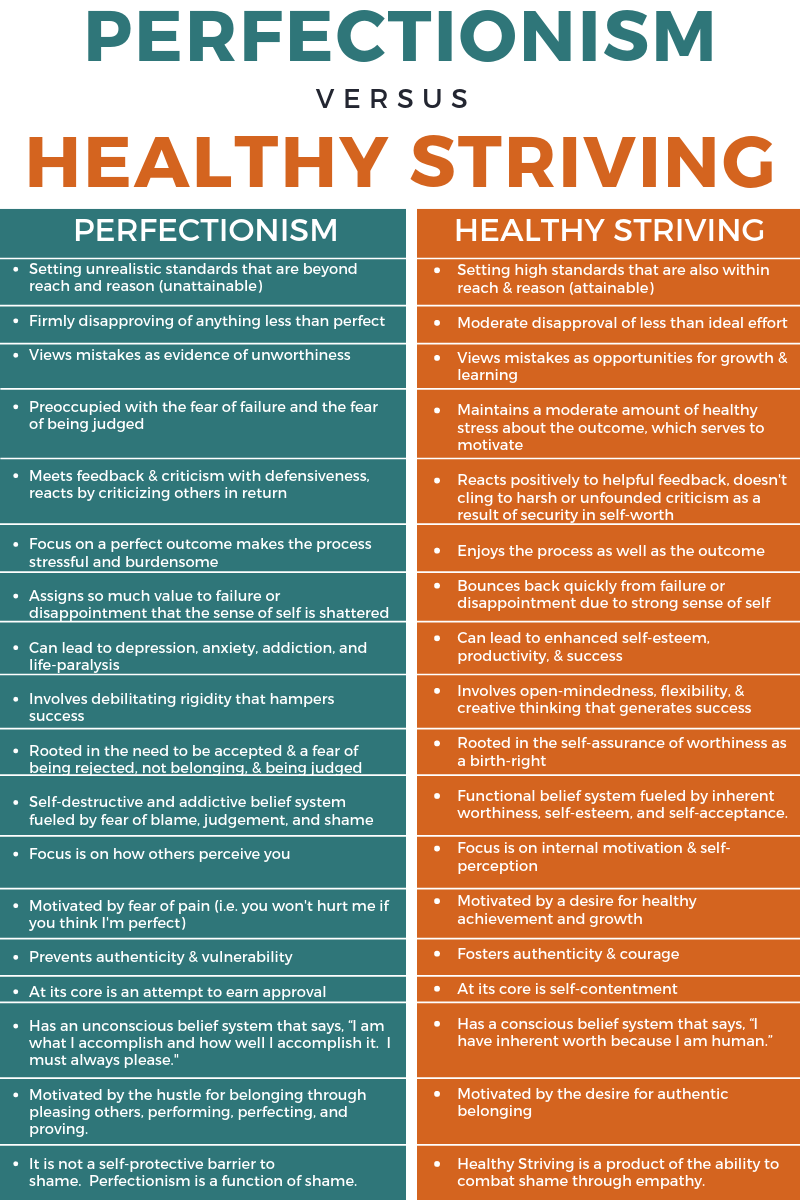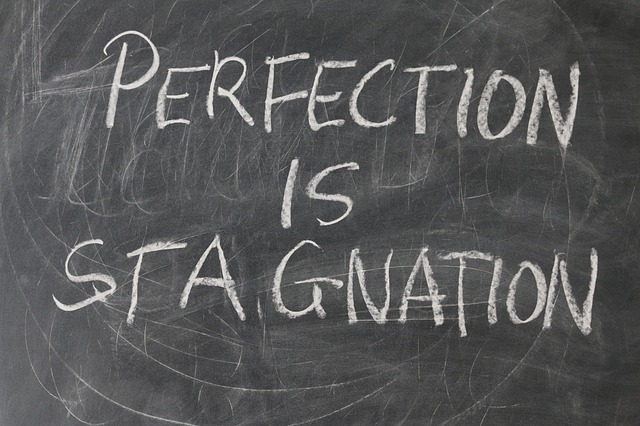Some of the greatest minds we’ve known have warned us about the dangers of perfectionism:
“Don’t let the perfect be the enemy of the good.”
-Voltaire
“The maxim ‘nothing but perfection’ may be spelled ‘paralysis.'”
-Winston Churchill
“A person who never made a mistake, never tried anything new.”
-Albert Einstein
“If you look for perfection, you’ll never be content.”
-Leo Tolstoy
And yet, in today’s age of hustling to be more, make more, and do more, perfectionism has morphed into a strength to be proud of, something we perceive to be the key to actually obtaining more. The trouble is, since perfection is usually impossible when it comes to humans, whatever that more is for you will likely always be just out of reach.
Perfectionism is often seen as something that drives attention to detail, high standards, and a commitment to excellence. Many people say they’re a perfectionist with a nervous laugh, hoping it comes off as a side kick to achievement. However, perfectionism is actually correlated with less achievement due to the suffocating nature of being afraid to produce anything less than perfect (which is nearly impossible, by the way). Perfectionism is not excellence or high standards. It’s paralysis.
So What Exactly is Perfection?
According to Brené Brown, perfectionism “is the belief that if we do things perfectly and look perfect, we can minimize or avoid the pain of blame, judgment, and shame.” In her book, “The Gifts of Imperfection,” she says that research shows that perfectionism hampers success. “In fact, it’s often the path to depression, anxiety, addiction, and life-paralysis,” Brown says.
Life-Paralysis?!
That’s quite a statement isn’t it? But think about it… if you are always coloring within the lines, afraid to take a risk and move forward with an idea, you are in effect paralyzed from taking action towards the life you are trying to live.
“Life-paralysis refers to all of the opportunities we miss because we’re too afraid to put anything out in the world that could be imperfect. It’s also all of the dreams that we don’t follow because of our deep fear of failing, making mistakes, and disappointing others.” -Brené Brown
Let’s take a closer look at what perfectionism is, and what it isn’t.
What Perfectionism Is
In her latest book Dare to Lead, shame researcher Brown breaks down what perfectionism is, and what it isn’t:
- Perfectionism is a self-destructive and addictive belief system that fuels this primary thought: If I look perfect and do everything perfectly, I can avoid or minimize the painful feelings of blame, judgement, and shame.
- Perfectionism is an unattainable goal. It’s more about perception than internal motivation, and there is no way to control perception, no matter how much time and energy is spent trying.
- Perfectionism is addictive, because when we invariably do experience shame, judgement and blame, we often believe it’s because we weren’t perfect enough. Rather than questioning the faulty logic of perfectionism, we become even more entrenched in our quest to look and do everything just right.
- Perfectionism actually sets us up to feel shame, judgement and blame, which then leads to more shame, judgement and blame: It’s my fault. I’m feeling this way because I’m not good enough.
- Perfectionism is a function of shame.
What Perfectionism Isn’t
Brené breaks down what is commonly mistaken as perfectionism, illuminating what perfectionism is NOT:
- Perfectionism is not striving for excellence. It’s not about healthy achievement and growth. Perfectionism is a defensive move.
- Perfectionism is not the self-protection we think it is. It’s a 20-ton shield we lug around, thinking it will protect us, when in fact it’s the thing that’s really preventing us from being seen.
- Perfectionism is not self-improvement. Perfection is, at its core, about trying to earn approval. Early praise for achievement and performance has become a dangerous and debilitating belief system: “I am what I accomplish and how well I accomplish it, please, perform, perfect, prove.”
- Perfectionism is not the key to success. In fact, research shows perfectionism hampers achievement and is correlated with depression, anxiety, addiction and life paralysis, or missed opportunities. The fear of failing, making mistakes, not meeting people’s expectations, and being criticized keeps us outside the arena where healthy competition and striving unfolds.
- Lastly, perfectionism is not a way to avoid shame.
Embracing Healthy Striving
While perfectionism is often a misguided attempt to secure the approval and acceptance of others, healthy striving is a more realistic form of motivation that leads to true inner satisfaction, lasting growth, and outcomes you can be proud of.

“The thing that is really hard, and really amazing,
is giving up on being perfect
and beginning the work of becoming yourself.”
– Anna Quindlen
If you want to learn more about how to ditch perfectionism and embrace healthy striving, how to bounce back from shame instead of being sucked into the shame, and how to live with courage and vulnerability, take a look at my upcoming Rising Strong workshops here.


